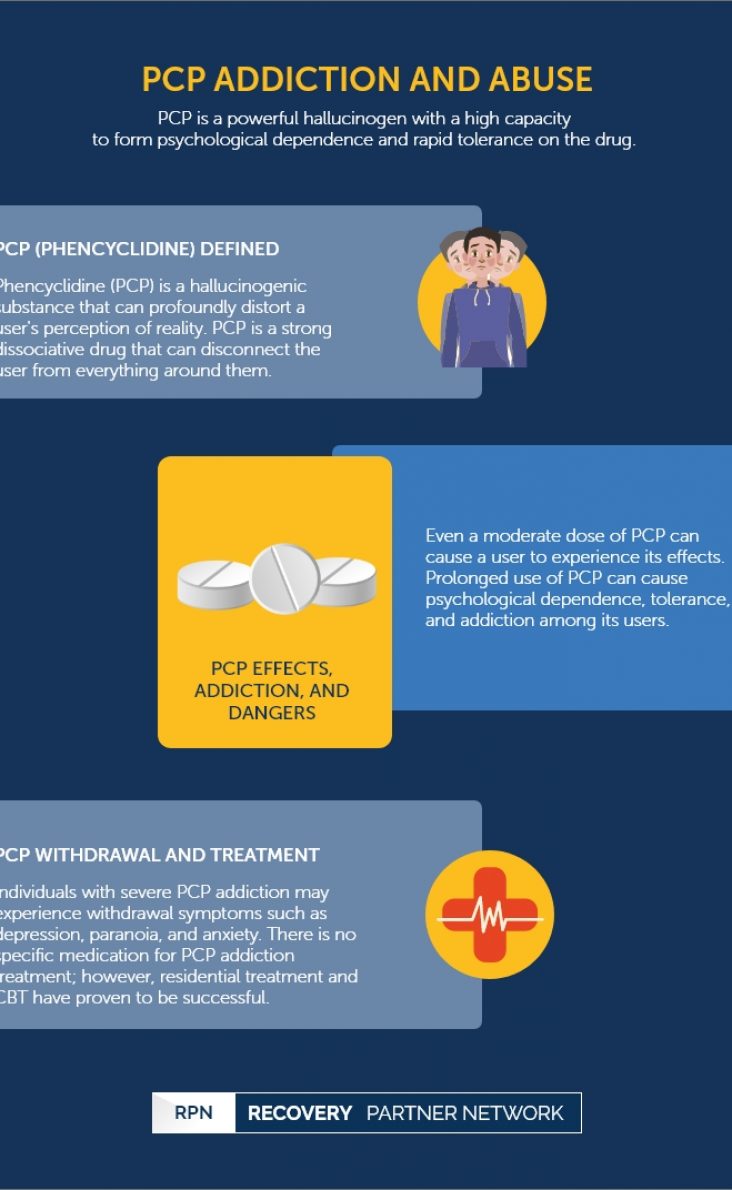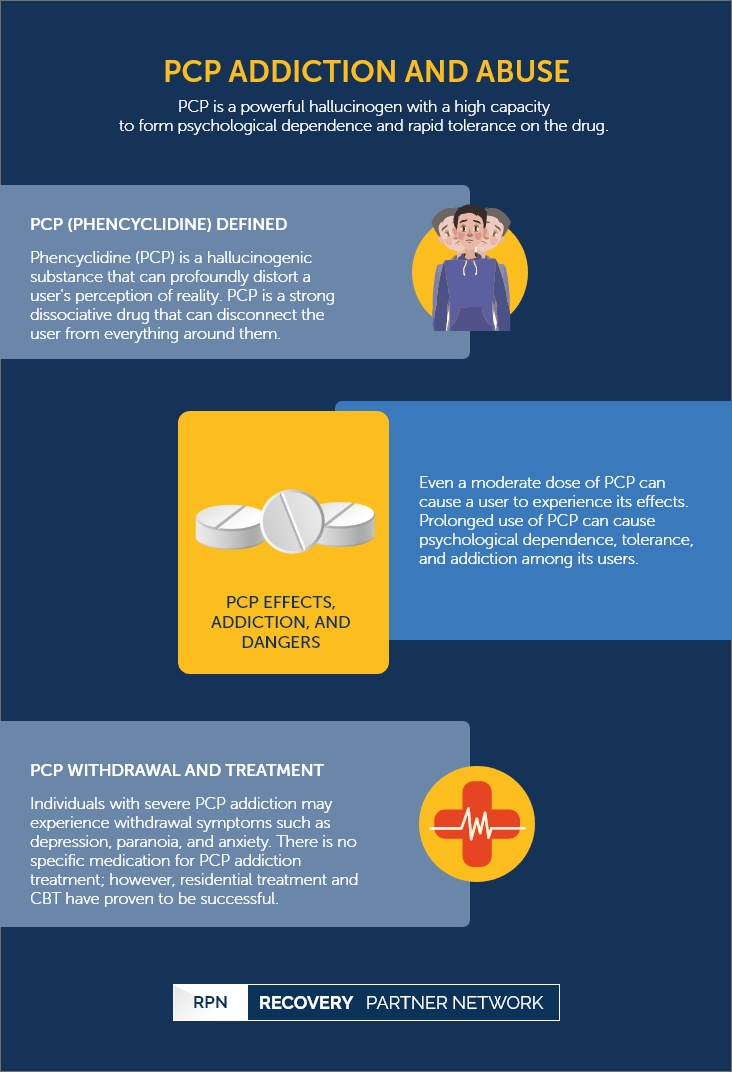PCP is a powerful hallucinogen with a high capacity to form psychological dependence and rapid tolerance on the drug.
PCP Addiction and Abuse
Illicit drugs
- Ayahuasca addiction – Abuse
- Baclofen addiction
- Black tar heroin addiction
- Cannabis addiction
- Cocaine dependence
- Crack cocaine addiction
- DMT addiction abuse treatment
- Does Marijuana Kill Brain Cells?
- Ecstasy addiction
- Gabapentin addiction
- gamma-Hydroxybutyric acid addiction
- Hallucinogen
- Heroin addiction
- Illicit drug addiction
- Inhalant addiction
- Cocaine
- Ketamine addiction
- Lysergic acid diethylamide addiction
- Mescaline addiction
- Methamphetamine addiction
- Meth Labs: Cooking up Addiction
- Meth Mouth
- Microdosing
- Phencyclidine addiction
- Psilocybin mushroom addiction
- Sage of the diviners – Addiction
- Shooting Heroin
- Shooting Methamphetamine
- Smoking Cannabis
- Speedball
- Synthetic cannabinoids
Phencyclidine addiction | Table of Contents
PCP (Phencyclidine) Defined
Phencyclidine (PCP) is a hallucinogenic substance that can profoundly distort a user’s perception of reality. PCP was initially introduced as an anesthetic in the 1950s and was later popularized as a recreational drug in the 1960s and 70s. PCP is a strong dissociative drug that has the ability to disconnect the user from everything around them.
PCP is a white crystalline powder that can be swallowed, smoked, snorted, or injected. This drug can easily be dissolved in water or alcohol and thus available in liquid form as well. This drug is classified as a Schedule II substance under the Controlled Substance Act. PCP is a bitter-tasting substance which is generally combined with a large number of contaminants and thus change in color and consistency from one batch to another. PCP is often combined with other substances such as cocaine, heroin, LSD, marijuana, and mescaline, typically unbeknown to the user.
Street names of PCP may include:
- Angel dust
- Hog
- Amoeba
- STP
- Supergrass
- Zoom
- Belladonna
- Peace pills
- Boat
- Animal trank
- Sherm sticks
- Embalming fluid
FAQ
PCP is a drug which is known for its mind-altering effects. It can cause distorted perceptions of sounds, and hallucinations which could lead to violent behavior.
PCP is widely abused due to its mind-altering effects, euphoric high, feeling of “superhuman” strength, adrenaline rush, and inability to feel pain.
PCP Effects, Addiction, and Dangers
Pharmacologically, PCP is a non-competitive NMDA (N-methyl-D-aspartate) receptor antagonist and glutamate receptor antagonist, while also simultaneously affecting the opioid, dopamine, and nicotinic receptors. The effects of PCP are activated within 20 to 90 minutes after oral consumption and may last for 4 to 6 hours. However, PCP consumed through smoking or injection can be felt within 2 to 5 minutes, and last for half an hour. Even a moderate dose of PCP can cause a user to experience its effects, and thus it is considered to be one of the most dangerous substances to be abused.
The immediate effects of PCP may include:
- The numbness in the extremities, loss of co-ordination, and slurred speech may be followed by a feeling of power and invulnerability.
- A blank stare, rapid and involuntary eye movements, and an abnormal gait.
- Auditory hallucinations, extreme mood disorders, image distortion, and amnesia may also occur.
- Acute anxiety and sense of imminent disaster, paranoia, violent hostility, psychosis distinct from schizophrenia.
Physiological consequences of low to moderate doses of PCP include:
- A rise in blood pressure and pulse rate
- Shallow respiration
- A slight increase in breathing rate
- Flushing and profuse sweating
Physiological effects of high doses of PCP include:
- A drop in the pulse rate, blood pressure, and respiration
- Nausea and vomiting
- Blurred vision
- Flicking up and down of the eyes
- Drooling
- Dizziness and loss of balance
- Prone to abrupt violence and suicidal behavior
Prolonged use of PCP can cause the formation of psychological dependence, tolerance, and addiction among its users. Since the body can build up a tolerance to the drug over time, increased dosages are needed to achieve the desired effects, resulting in an increased risk of an overdose.
PCP can affect each individual differently. The variance in effects may be attributed to the dosage consumed and the method of consumption. Although there is limited research on the long-term health consequences of PCP, users have reported experiencing the following symptoms after prolonged use.
Long-term side effects may include:
- Memory loss
- Substantial weight loss
- Speech difficulties
- Anxiety, depression, and suicidal thoughts
Many individuals find themselves forming an addiction to PCP due to their ability to alter their reality and consciousness. Many who abuse hallucinogens are known to suffer from pre-existing psychological conditions, and the use of such drugs provides them an escape from reality. Consequently, these individuals stand a high chance of developing a psychological dependence on the drug.
Typical symptoms of PCP addiction are:
- Delusions
- Confusion
- Hallucinations
- Euphoria
- Exaggerated strength
- Increased heart rate
- Numbness
- Increased blood pressure
- Feelings of detachment
- Rapid respiration rate
- Memory loss
- Physical and psychological distress
- Anxiety
- Paranoia
- Seizures
- Chills
- Muscle cramps
- Vomiting
- Death
- Rhabdomyolysis
- Dehydration
- Loss of co-ordination
- Disorientation
- Extreme fear or panic
- Invulnerability
- Aggression
The effects of PCP are highly unpredictable. While some users may experience euphoric feelings, others may encounter stressful and frightening hallucinations. It is very difficult to distinguish which effects may arise from PCP because it often relies on the mental state of the user.
Due to PCP’s sedative effects, combining this drug with other CNS depressants such as alcohol or benzodiazepines can be highly lethal as it can drastically increase the chance of an overdose. These individuals generally display violence and suicidal behaviors that can be dangerous to them and to those around them.
Signs of an overdose may include:
- Agitation
- Hallucinations
- Convulsions
- Psychosis
- Catatonic trance
- Uncontrolled movements
- An altered state of consciousness
- Coma
FAQ
PCP consumption could lead to risk-taking behaviors, which can put the user and those around at serious risk. The other physiological harm caused by PCP may include numbness, elevated blood pressure, increased heart rate, blurred vision, sweating, lack of body control, rigid muscles, uncontrolled eye movement, and unconsciousness.
The signs of PCP use disorder may include intense cravings, spending all your time obtaining, using, and recovering from the effects of PCP, neglecting responsibilities and obligations, continuing to use the drug despite its negative effects, repeated failure to stop using PCP, and consuming more than intended.
Recognizing PCP Addiction
According to the Diagnostic and Statistical Manual of Mental Disorders (DSM-5), individuals with PCP abuse or addiction may experience two or more of the following criteria.
- Spending quite a lot of time obtaining, using, or recovering from PCP
- Using PCP in situations which are dangerous to self or others
- Failing to carry out responsibilities at school, work, or home
- Continuing to use PCP despite interpersonal or social problems
- Development of drug tolerance
- Experiencing cravings
- Dropping out of social, occupational, or recreational activities
- Using PCP despite physical or psychological problems
- Taking more PCP than intended
- Inability to cut back or quit the use of PCP
FAQ
The available tests for screening PCP include hair tests, urine tests, and oral fluid tests. Since PCP is classified as a Schedule I drug that falls under the federally mandated drug tested panels, employees at certain organizations are regularly tested in order to keep their workplaces drug-free.
Blood tests can track the drug within 1-4 hours. Hair tests can detect PCP after 5-10 days of use and up to 90 days. Urine tests can detect the drug after 4-6 hours and up to 7-14 days. Saliva tests can generate results for up to three days.
PCP Use Statistics
PCP is making a comeback as more and more users combine this drug with cigarettes and marijuana.
- A report from Washington D.C noted that 10 percent of adults in the justice system tested positive for the substance.
- During recent years 1 percent of students in the 12th grade had PCP in their system.
- PCP-related emergency room visits increased by 400 percent between 2005 and 2011. Males contributed to 69 percent of these numbers, while the most frequent ages in 2011 were between 25 and 39.
- According to a report in 2011, emergency room visits for PCP, MDMA, and LSD peaked at 75,538.
- 2017 data shows that 2.2 percent of individuals aged 12 years and older have undergone lifelong PCP use, and 2.7 percent of them used PCP at least once in their life.
PCP Withdrawal and Treatment
Individuals who form a dependence on PCP may experience intense symptoms when they abruptly cease the consumption of the drug. These symptoms are referred to as withdrawal symptoms. PCP users may experience a variety of physical and psychological withdrawal symptoms.
PCP withdrawal symptoms may include:
- Anxiety
- Increased appetite
- Depression
- Intensified PCP cravings
- Paranoia
- Diarrhea
- Chills Headaches
- Sweating
Individuals struggling with severe addiction may experience withdrawal symptoms such as hallucinations, flashbacks, memory loss, difficulty in talking/ thinking, and mood disorders that could persist years after quitting the drug.
Individuals who wish to quit their drug habit are highly advised to seek medically assisted treatment at an inpatient or outpatient treatment facility. These treatment facilities will provide patients with a safe and secure environment to undergo detoxification and therapy. Depending on the severity of the withdrawal symptoms, patients will be prescribed medications to help alleviate the intensity of such symptoms. Patients will also be monitored around the clock to maintain their safety and the safety of those around them.
Although there is no specific medication for PCP addiction treatment, residential treatment and cognitive-behavioral therapy (CBT) have proven to be successful in helping patients better understand their substance use disorder and address any co-occurring psychiatric disorder. These treatment programs will help address a patient’s physical and psychological dependence on PCP and help them achieve a long term recovery.
FAQ
PCP addiction can be effectively treated through a medically assisted detoxification program and inpatient treatment program.
Recovery Partner Network
We aim to educate and empower. If you feel our library of resources does not cover your specific need, reach out to us, and we would be happy to help.
STATISTICS
© Copyright 2025


